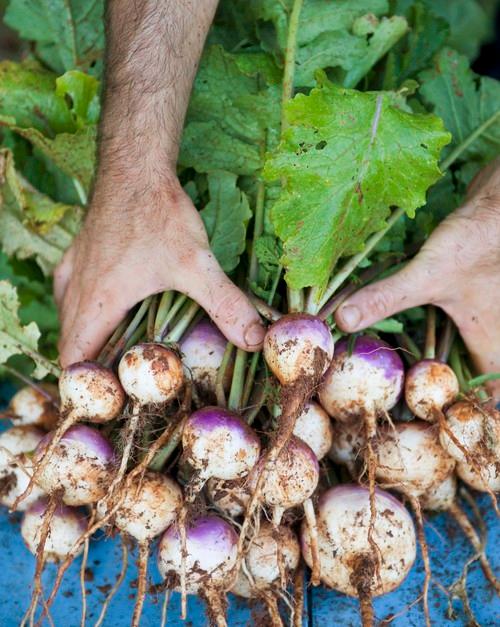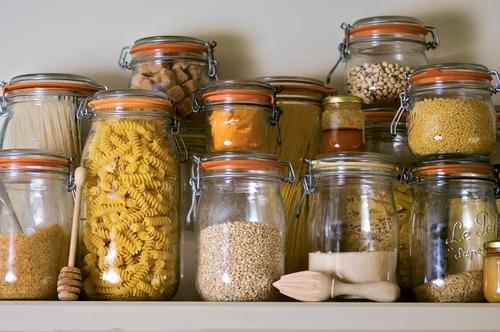1. Eat less meat. Try out Meatless Monday or cut out meat on the weekends. By starting small, you’re making a huge impact on the planet, as animal farming is the largest contributor to greenhouse gases. There are plenty of delicious vegetarian options out there, which will get you more creative in the kitchen!
2. Buy local. Try shopping at your local farmer’s market or sign up for a Community Supported Agriculture (CSA) share with a local farm. Buying local food ensures that your local farmer stays in business, promotes plant diversity, and is the freshest possible option.
3. Buy organic. If you have the means, always choose organic! By doing so, you’re not paying into a system that mistreats the planet with harsh chemicals. If you’re strapped for cash, stick to the clean 15 and avoid the dirty dozen. These are the fruits and veggies that experts believe to be most worth the extra money for organic based on pesticide use.
Your local farmer’s market is a great place to start eating sustainably. Anthony Masterson Photography/StockFood
4. Eat sustainable seafood. If you eat fish, seek out sustainably raised seafood. If you live in the Bay area, check out my friend Beck’s company, Small Boat Seafood!
5. Eat fewer processed foods. Aside from generally being harmful to your body, processed foods rely heavily on highly subsidized corn (in the form of high-fructose corn syrup) and don’t encourage a diverse food system.
6. Grow your own food. Have a window sill? Pot up some herbs, such as basil or mint to add to your salads. Have a backyard? Try your hand at growing leafy greens and radishes, which generally require less time to grow than root vegetables. Gardening is awesome, and growing your food can be extremely rewarding.
7. Compost. If you have the space, you can get buy a pre-made composter or build one yourself. No backyard? No problem! You can buy or make your own worm composting bin that can live in your kitchen. If you keep your worms fed regularly, there shouldn’t be any bad smells coming from there. By composting, you’re diverting your food waste from a landfill and turning it into nutrient-dense soil for your garden or potted plants (see #6!)
8. Preserve the harvest. All the berry-picking you do in the summer would make delicious jam in the fall or winter. Same goes for fall apple picking; you can enjoy apple sauce anytime of the year. With a little bit of planning, your can preserve lots of food.
9. Cook! The easiest and most straightforward way to eat more healthfully and sustainably is to take some time to cook every week. I love Tamar Adler’s approach of doing all your roasting and baking on a Sunday in order to have meals for the whole week. Check out this video for some serious inspiration.
10. Buy in bulk, and reduce food packaging. Ever tried shopping in the bulk section of your grocery store? It’s a great place to save money and packaging for things like grains, flours, nuts, and lentils.
Buying in bulk can be a great way to save money. Photo: Golden Goose Productions/StockFood
11. Buy fair trade or direct trade coffee and chocolate. The coffee and chocolate industries have a long history of paying low wages for workers. By cutting out the middleman and working directly with farmers, you’re supporting fair-wage practices for cocoa and coffee farmers across the globe. Plus, it’s delicious.
12. Invest in reusable kitchenware such as bamboo cutlery, textiles, and even mason jars. This is a great way to reduce waste in the kitchen.
13. Stop buying bottled water! Buy a cute water bottle and fill it up at the tap. If you’re concerned about the tap water in your region, you can always buy a water purifier. You’ll be saving money in the long run and reducing all that plastic.
14. Ask Questions. Whenever you’re out buying groceries or are at a restaurant, ask questions. This skit my be over the top, but it never hurts to ask! You may be pleasantly surprised with the answer you get.
15. Enjoy it! Good, healthy, sustainable food is meant to be shared with close friends and family. Consider having weekly potlucks or a rotating dinner schedule with neighbors. This will take some time off your hands, get you to try new foods, and celebrate the beauty of local food!



No comments:
Post a Comment